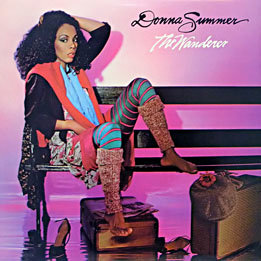With collaborators Giorgio Moroder and Pete Bellotte, Summer revitalized the pop
scene, bringing the churning, burbling synthesizers of European Kraftwerk-style
dance music to American ears in songs like “I Feel Love” and “Down Deep
Inside.” From 1977 to 1980, Summer, Moroder, Bellotte and Harold Faltermeyer
created a stunning string of hits, several of which brought them Grammys: “I
Love You,” “Last Dance,” “Heaven Knows,” “MacArthur Park,” “Hot Stuff,” “Bad
Girls,” “Dim All the Lights” and “On the Radio.”
Even more impressive was
Summer’s growth as an artist. No longer was she pigeonholed as the
heavy-breathing siren; she had demonstrated genuine strength and versatility as
a singer, even holding her own against Barbra Streisand on the chart-topping
1979 duet, “No More Tears (Enough is Enough).” Summer’s “Live and More” album
showed she was not, like many disco stars, a creature of the studio — she could
belt with the best of them, then turn around and deliver sweet interpretations
of “I Got It Bad and That Ain’t Good” or George Gershwin’s “The Man I Love.”
Summer also wrote or co-wrote much of her material, including the four superb
ballads (“On My Honor,” “There Will Always Be a You,” “All Through the Night”
and “My Baby Understands”) that make up the third side of her 1979 “Bad Girls”
album.

“Bad Girls” remains an essential album of its time, right up there with
Fleetwood Mac’s “Rumours,” The Eagles’ “Hotel California” and the “Saturday
Night Fever” soundtrack. But although it was Summer’s biggest seller, she would
not attempt to duplicate its formula. After battling exhaustion and an
addiction to prescription drugs, Summer wed Casablanca
Records labelmate Bruce Sudano in 1980. Around the same time, she shocked
the music world with the announcement that she was a born-again Christian and
Instead, she moved to Geffen Records and began pushing her music toward rock
and electronica. Her spiritual journey is chronicled in the underrated 1980
album, “The Wanderer,” in which she strips away the glamor of life in the fast
lane to expose the angst and avarice beneath it in songs like the frenzied,
hard-rocking “Running For Cover” and the eerie, ethereal “Grand Illusion,” in
which her mezzo-soprano voice floats like a ghost through Faltermeyer’s forest
of shivery synthesizers. Critics loved the record, but many of Summer’s fans
were confused and Geffen executives were displeased with her change of
direction: The label shelved Summer’s similarly adventurous follow-up album,
“I’m a Rainbow,” which was finally released almost 15 years after it was
recorded.
No stranger to controversy, Summer weathered a storm of negative publicity
after a Village Voice concert reviewer charged her with making homophobic
remarks at a show in 1983. She denied the allegations, telling a reporter from
The Advocate that she had originally misunderstood the severity of AIDS before
she lost many friends to the disease.
“A couple of the people I write with
are gay, and they have been ever since I met them,” she said. “What people want
to do with their own bodies is their personal preference. I’m not going to
stand in judgment about what the Bible says about someone else’s life. I’ve got
things in my own life I’ve got to clean up. What’s in your life is your
business.”
Aside from occasional hits like “She Works Hard For the
Money” and “Love is in Control (Finger on the Trigger),” Summer spent most of
the 1980s in commercial limbo, making records that sold modestly and got
passable reviews. As the decade drew to a close, she teamed up with the
then-hot production team of Mike Stock, Matt
Aitken and Pete Waterman for the “Another Place and Time” album, which featured
her last major American radio hit, “This Time I Know It’s For Real.”
But Summer still had one more comeback to make. In 2008, after more than a
decade away from the studio, she released “Crayons,” which hit No. 17 on the
Billboard album chart and produced substantial club hits in “Stamp Your Feet,”
“I’m a Fire” and “Fame (The Game).” Summer was reportedly working on more new
music recently.
In the spring of 1989, I was on a business trip in Deptford,
N.J. I remember getting in a cab, only to find the driver had the radio
blaring. I was about to politely complain, until Summer’s “This Time I Know
It’s For Real” came on. “Whaddya know?” the cabbie squawked. “Donna Summer’s
back!” “She certainly is,” I agreed.
Support City Pulse - Donate Today!
Comments
No comments on this item Please log in to comment by clicking here